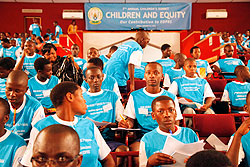The United Nations Children Fund (UNICEF) Representative to Rwanda, Noala Skinner, has said the footprint of Rwandan children will be firmly planted in the nation’s social and economic development. Her remarks were contained in a statement released on Friday, following the country’s Seventh Annual Children’s Summit, where children fully participated in the discussions and recommendations regarding the concerns affecting them as well as their role in the country’s economic development.


The United Nations Children Fund (UNICEF) Representative to Rwanda, Noala Skinner, has said the footprint of Rwandan children will be firmly planted in the nation’s social and economic development.
Her remarks were contained in a statement released on Friday, following the country’s Seventh Annual Children’s Summit, where children fully participated in the discussions and recommendations regarding the concerns affecting them as well as their role in the country’s economic development.
"I feel full of hope that the footprint of children and in particular the promotion and protection of the rights of the most vulnerable children and families will be firmly planted in the nation’s new Economic Development and Poverty Reduction Strategy (EDPRS),” she said in the statement.
Skinner highlighted the importance of every child, regardless of background and means.
UNICEF ‘s Executive Director, Anthony Lake said he was amazed by the way the government includes children in national development.
"Rarely have I heard of such an inclusive process in the planning of a national development event where children are contributing ideas…debating recommendations…and shaping the future of their country,” he said.
Lake added that this does not happen in many countries. He went on to congratulate Rwanda for its focus on equity; reaching the most disadvantaged, which he felt was not only morally right, but financially shrewd.
What was unique about the summit was the participation of children living with disabilities, from orphanages and from refugee camps, along with children who represented each of Rwanda’s 416 sectors.
Top amongst their recommendations was the inclusion of children living with disabilities in all fora and special attention to their needs, whether in school, in health facilities or in families.
The children also emphasised the importance of better social protection for vulnerable children, fighting violence against children, eliminating malnutrition, promoting hygiene, ensuring school meals, increasing access to early childhood development services and making sports and electricity available in all schools.
The summit was organised by the National Children’s Commission, in partnership with the Ministry of Gender and Family Promotion, UNICEF and other partners to discuss how children could contribute to the nation’s second EDPRS as well as ensure their rights to family life, quality healthcare and inclusive education.
The summit was aired live on Rwandan television, radio and on social media and children who could not attend were able to SMS or call in with questions for government officials in attendance to respond to.
Children’s Summits have been organised in Rwanda since 2004 to give children a democratic forum to express their views on matters that concern them.


